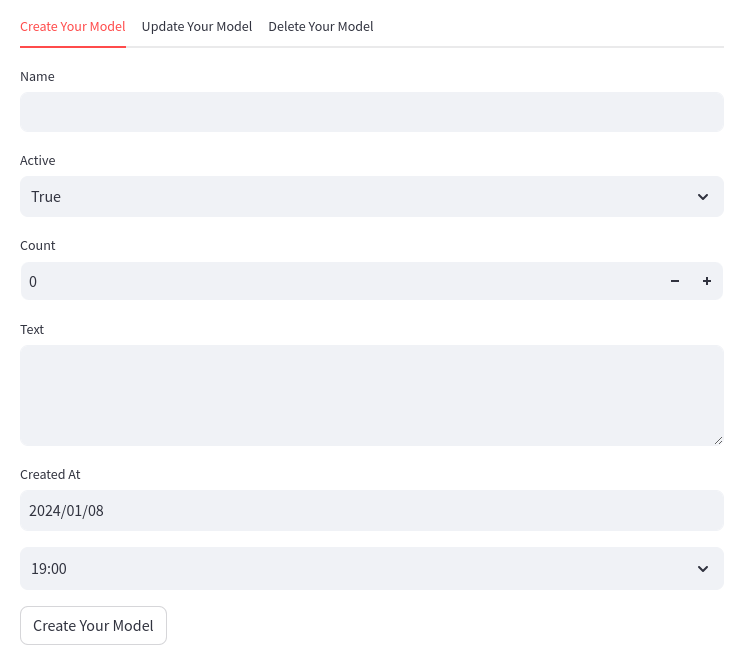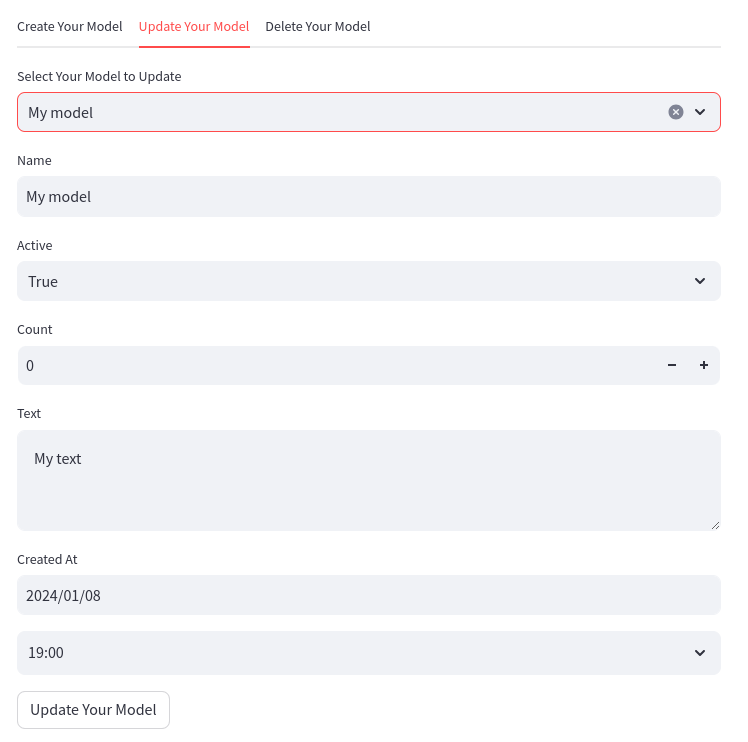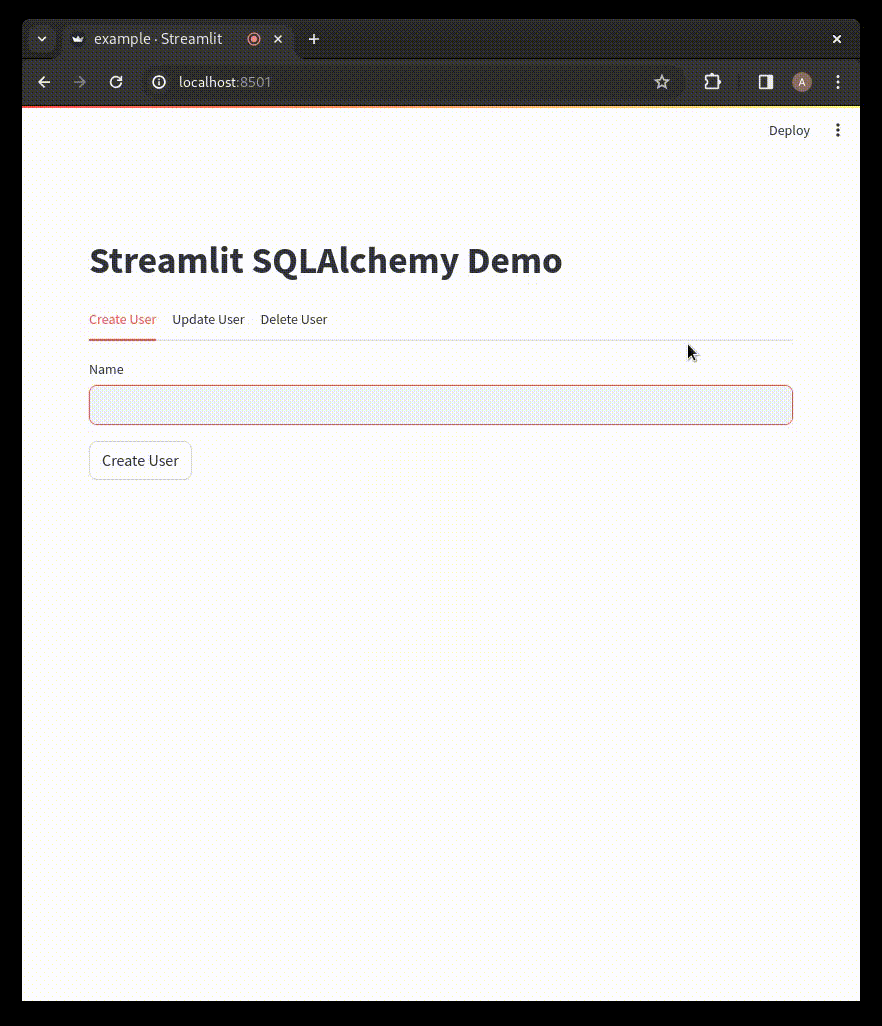streamlit_sqlalchemy is a Python module that provides seamless integration between Streamlit and SQLAlchemy models. It simplifies the process of creating, updating, and deleting database objects through Streamlit's user-friendly interface.
- Easy Initialization: Initialize the SQLAlchemy connection with a simple method call.
- CRUD Operations: Create, read, update, and delete operations are streamlined with minimal code.
- Dynamic Forms: Automatically generate forms for creating and updating database objects.
- SQLTypes Support:
String,Text,Integer,Float,Boolean,Date,DateTime,Time. - Foreign Key Support: Easily handle foreign key relationships in forms.
pip install streamlit_sqlalchemy-
Initialize the Engine:
from streamlit_sqlalchemy import StreamlitAlchemyMixin # Create your SQLAlchemy model class YourModel(Base, StreamlitAlchemyMixin): __tablename__ = "your_model" id = Column(Integer, primary_key=True) name = Column(String) active = Column(Boolean, default=True) count = Column(Integer) text = Column(Text) created_at = Column(DateTime) # Initialize the connection StreamlitAlchemyMixin.st_initialize(connection=conn)
-
CRUD Tabs:
YourModel.st_crud_tabs()
-
Create Form:
YourModel.st_create_form()
-
Edit Button:
your_model_instance.st_edit_button("Edit", {"field": "value"})
-
Delete Button:
your_model_instance.st_delete_button()
-
Customize behavior with Meta Attributes:
class YourModel(Base, StreamlitAlchemyMixin): __tablename__ = "your_model" id = Column(Integer, primary_key=True) name = Column(String) active = Column(Boolean, default=True) count = Column(Integer) text = Column(Text) created_at = Column(DateTime) # Customize the form fields with non-defaults __st_input_meta__ = { 'name': st.text_input, 'active': lambda *a, **kw: st.checkbox(*a, **kw, value=False), } # Customize display of the instances in the selectbox __st_repr__ = lambda _self: f'{self.name} ({self.count})' # Customize the order of the instances in the selectbox __st_order_by__ = lambda _self: self.count
-
CRUD Tabs:
YourModel.st_crud_tabs( defaults={"name": "Default Name"}, # Will not appear in the create form filter_by={"active": True}, # Will filter the instances in the selectbox except_columns=["active"], # Will not appear in the update form border=True, # Will add a border around the form )
-
Create Form:
YourModel.st_create_form( defaults={"active": False}, # Will not appear in the form border=True, # Will add a border around the form )
-
Edit Button:
your_model_instance.st_edit_button( "Edit", # Button label {"name": "New Name"}, # Will be updated on click # Any other kwargs will be passed to the st.button )
-
Delete Button:
your_model_instance.st_delete_button( label="Delete", # Button label # Any other kwargs will be passed to the st.button )
import streamlit as st
from sqlalchemy import create_engine, Column, String, Integer
from sqlalchemy.ext.declarative import declarative_base
from streamlit_sqlalchemy import StreamlitAlchemyMixin
Base = declarative_base()
class ExampleModel(Base, StreamlitAlchemyMixin):
__tablename__ = "example"
id = Column(Integer, primary_key=True)
name = Column(String)
# Initialize the connection
CONNECTION = st.connection("example_db", type="sql")
Base.metadata.create_all(CONNECTION.engine)
StreamlitAlchemyMixin.st_initialize(CONNECTION)
# Create CRUD tabs
ExampleModel.st_crud_tabs()import logging
from pathlib import Path
import streamlit as st
from examples.models import Base, Task, User
from streamlit_sqlalchemy import StreamlitAlchemyMixin
def show_single_task(task):
col1, col2, col3 = st.columns([1, 1, 1])
if task.done:
col1.write(f" - ~~{task.description}~~")
with col2:
task.st_delete_button()
else:
if task.due_date:
date_color = "red" if task.due_date < datetime.now() else "green"
col1.write(f" - {task.description} (:{date_color}[{task.due_date.strftime('%H:%M - %d.%m.%Y')}])")
else:
col1.write(f" - {task.description}")
with col2:
task.st_edit_button("Done", {"done": True})
with col3:
task.st_delete_button()
def app():
st.title("Streamlit SQLAlchemy Demo")
User.st_crud_tabs()
with CONNECTION.session as session:
for user in session.query(User).all():
with st.expander(f"### {user.name}'s tasks:"):
c = st.container()
st.write("**Add a new task:**")
Task.st_create_form(defaults={"user_id": user.id, "done": False})
with c:
if not user.tasks:
st.caption("No tasks yet.")
for task in user.tasks:
show_single_task(task)
def main():
if not Path("example.db").exists():
Base.metadata.create_all(CONNECTION.engine)
StreamlitAlchemyMixin.st_initialize(connection=CONNECTION)
app()
if __name__ == "__main__":
# initialize the database connection
# (see https://docs.streamlit.io/library/api-reference/connections/st.connection)
CONNECTION = st.connection("example_db", type="sql")
main()You can explore this provided example, and launch it from the root directory (because it relies on relative imports):
python -m streamlit run examples/example.pyWe welcome contributions! See our contribution guidelines for more details.
This project is licensed under the Apache License 2.0 - see the LICENSE file for details.


